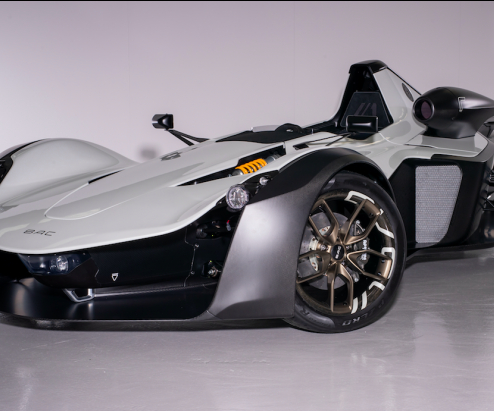BAC launches graphene-enhanced carbon fiber intensive supercar
Briggs Automotive Company’s Mono R is the first production car in the world to fully incorporate the use of graphene-enhanced carbon fiber in every body panel.

BAC’s new Mono R supercar features graphene-enhanced carbon fiber body panels. Source | Briggs Automotive Company
Briggs Automotive Company (BAC, Liverpool, U.K.) has officially launched the all-new Mono R — a higher-performance, lighter and more advanced new generation of the iconic Mono single-seater supercar.
The Mono R is the first production car in the world to fully incorporate the use of graphene-enhanced carbon fiber in every body panel. According to BAC, the graphene enhances the structural properties of the fiber to make panels stronger and lighter with improved mechanical and thermal performance. This achievement is the result of a successful APC-funded Research & Development project into the production-readiness of graphene. Working alongside Haydale Composite Solutions (Loughborough, U.K.) and Pentaxia Composites (Derby, U.K.) through the Niche Vehicle Network (NVN), BAC is now launching the advantages into series production.
BAC has also teamed up with global science corporation DSM (Heerlen, Netherlands) to use additive manufacturing for the first time on Mono R. By 3D printing parts using high-performance polymers, BAC has been able to reduce the design-to-manufacture timeframes of complex geometrical components as well as save further weight.
Elsewhere, magnesium chassis and transmission components combine to reduce mass and improve weight distribution, while new carbon-ceramic brakes, which save 2.55kg of unsprung mass per corner, are fitted as standard. A titanium exhaust system, lighter AP Racing brake calipers and an all-new carbon floor all contribute to the Mono R weighing a significant 25 kilograms less than the standard Mono, at 555 kilograms.
Related Content
-
Natural fiber composites: Growing to fit sustainability needs
Led by global and industry-wide sustainability goals, commercial interest in flax and hemp fiber-reinforced composites grows into higher-performance, higher-volume applications.
-
Plant tour: Teijin Carbon America Inc., Greenwood, S.C., U.S.
In 2018, Teijin broke ground on a facility that is reportedly the largest capacity carbon fiber line currently in existence. The line has been fully functional for nearly two years and has plenty of room for expansion.
-
The lessons behind OceanGate
Carbon fiber composites faced much criticism in the wake of the OceanGate submersible accident. CW’s publisher Jeff Sloan explains that it’s not that simple.
















